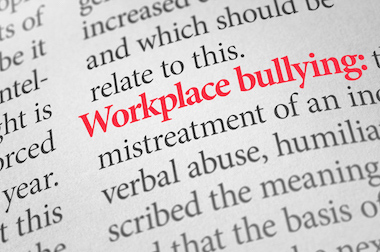We all have the right to work in an environment where our contributions are valued, where we feel appreciated and comfortable. But what can you do when that’s not the case?
If you’re unhappy at work, it may be because you’re being bullied. That’s a big word to use when maybe all that’s happened is the odd criticism here and the occasional unfunny joke at your expense there. Are you just being paranoid or could there be more to it? 
Bullying and harassment at work can manifest itself in many ways. The behaviour may gradually get worse, making it difficult to identify when the invisible line was crossed into bullying territory. And because it’s so difficult to pinpoint, people who are feeling bullied tend to find it harder to concentrate at work, meaning mistakes occur more easily which then makes the situation worse. It can be a vicious circle that has a devastating effect on your working life.
Recognising the bullying behaviour is the first step to taking action to stop it. If you’re not sure whether you’re experiencing bullying at work, here are some clear signs that you should not ignore.
- You are not being treated in the same way as your colleagues.
Do others receive preferential treatment – days off, special projects, job perks etc – while your requests are routinely turned down without good reason? Do menial tasks always come your way but never your peers’? Double standards in the office should not be acceptable.
- You face unfair obstacles at every turn.
While others thrive in their jobs and get promoted, your achievements and progress are hindered at every turn, almost as if someone was trying to prevent you from being successful in the job.
- You are micromanaged at every turn.
If your line manager and co-workers constantly undermine your choices and decisions without reasonable explanation, they clearly don’t trust your judgment. You, however, have no idea what, if anything, you have done wrong or how you can rectify any perceived problem.
- Your work is unfairly criticised.
You feel as if you can’t do a thing right. Every feedback is negative, leaving you feeling bad about your performance. No attempt is made to provide encouragement, guidance or training to improve your performance.
- Your work is disregarded.
As you work on a project, goalposts are moved or the project dropped altogether without anyone bothering to tell you. Your contribution is not recognised nor your opinion sought. It feels as though you don’t exist!
- You are not given credit for your work.
Similarly, if you have managed to achieve something worthwhile, your efforts are not acknowledged by the management, never mind celebrated, while credit is officially given to others in the company.
- You are no longer included.
You may no longer be invited to meetings you used to attend, and no good reason is given for any reduced social interaction from co-workers or managers. This may also apply to after-work socialising. Suddenly, you’re on your own.
- You are being verbally abused.
Are you experiencing negative language, insults or reprimands on a regular basis? Do you find that you’re often the butt of the office joke? Verbal bullying can be quite subtle, but still leaves you feeling left out and ill at ease.
- Your colleagues are ganging up on you.
Do you find that you are always at odds with other people’s views? It doesn’t seem to matter what the discussion is about, it always ends up with the other sticking up for each other and arguing against you.
- Your health is getting worse.
Bullying can take its toll on your physical and mental health. Are your energy levels low, do you feel depressed, anxious or moody a lot of the time? Physical symptoms can include eating disorders, sleep problems, rapid heartbeat and high blood pressure.

If you recognise one or more of the above scenarios, you may be experiencing bullying in the workplace. It’s a difficult situation and not one that any employee should have to put up with. Rather than suffer in silence, or resign without resolving the issue, it’s a good idea to confront the problem in a professional manner.
Speak to the individual concerned and explain why he makes you feel uncomfortable – it is possible that he may not even realise he is doing it and will be mortified! If nothing changes, ask for a private meeting with your manager to express your concerns. It helps to have a record of particular incidents and events to refer to. Your manager will be taking your allegations very seriously and should do their utmost to resolve the issue.
If there is still no improvement, you should escalate your complaint to the HR department, if there is one. If all else fails, you can take legal action for compensation, or for the offending person to be removed.

i find this interesting, some people wouldn’t even realise they were being subject to bullying!